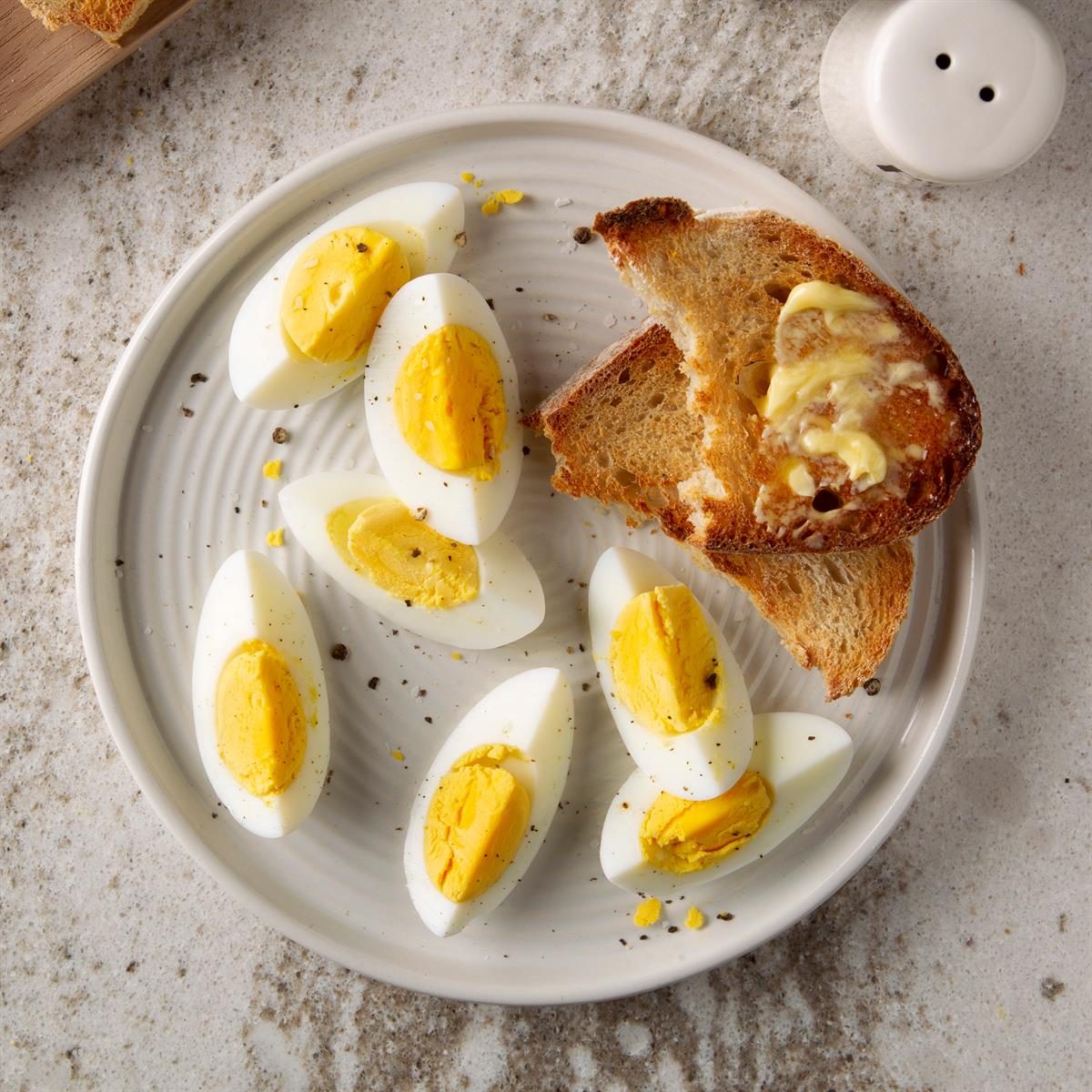Learn how to make perfect hard-boiled eggs with our foolproof stovetop method. The eggs peel easily and have vibrant centers—no gray or chalky yolks here! If the stovetop isn't for you, we show you how to make hard-boiled eggs in the oven, slow cooker, Instant Pot and air fryer.

Hard-Boiled Eggs

Hard-boiled eggs are handy to have around. They make a fantastic protein-rich breakfast or snack and can be used in any number of recipes. Think classics like deviled eggs, egg salad, chopped salad and potato salad. Or, jammy soft-boiled eggs can elevate instant ramen noodles and add depth to grain bowls. No wonder learning how to hard-boil eggs is an essential kitchen task!
You might already know the basics for a stovetop hard-boiled egg recipe: Put the eggs in water and bring it to a boil. But the trick is to master the timing and temperature to ensure the eggs are cooked just right. Our guide to boiling eggs demystifies the process, showing you exactly how long to boil eggs on the stovetop (including cooking time guidelines for soft-boiled and hard-boiled eggs).
How to Make Hard-Boiled Eggs
There are several ways to make perfect hard-boiled eggs. You can boil eggs in an Instant Pot, oven, slow cooker, air fryer or egg cooker. Every method works, but stovetop-boiled eggs are the most foolproof.
The key is to start the eggs in cold water, then quickly bring the water to a boil. Gradually heating the eggs prevents hard-boiled eggs with rubbery egg whites. This method also gives the eggs time to release air slowly, significantly reducing the chance of cracked shells. But cooking the eggs in boiling water can lead to overcooked eggs, so we remove the pot from the heat and let the eggs stand in the hot water. The result is perfect hard-boiled eggs with sunshine-bright yolks that cook without turning gray or chalky.
How Long to Boil Eggs on the Stovetop

How long it takes to boil eggs really depends on how you like your eggs cooked! You can make the perfect eggs by adjusting how long the eggs stand in the hot water.
- Soft-boiled eggs: After six minutes, the yolks will be runny and silky.
- Medium-boiled eggs: After nine minutes, the yolks will be mostly set with a jammy, gel-like texture.
- Firm-boiled: After 12 minutes, the yolks will be firm but slightly soft in the center.
- Hard-boiled: After 15 minutes, the yolks will be fully hardened.
One thing to note: These cooking times are based on large eggs cooked at sea level. The cooking time will need to be adjusted slightly for smaller or larger eggs or for high-elevation cooking. We’ll expand more on that later!
Hard-Boiled Egg Ingredients
- Eggs: For a hard-boiled egg recipe, you can use any type of egg, from farm-fresh eggs to store-bought cage-free vs. free-range eggs. Older eggs result in easy-peel hard-boiled eggs, but make sure they aren’t so old that they’re rotten (do a float test to tell if an egg is bad, and throw it away if it floats). Regardless of the eggs’ age, we recommend using room-temperature eggs because they cook more evenly and are less likely to crack. Remove the eggs from the fridge at least 30 minutes before cooking them. If you forget, submerge the eggs in a bowl of hot water for a few moments before cooking.
- Cold water: You can boil eggs using any kind of water, tap or filtered, as long as it starts cold. The eggs cook more evenly if they’re gradually heated with the water on the stove.
- Ice bath: An ice bath is simply a bowl of ice and cold water. It quickly halts the cooking process, reducing carryover cooking that leads to overcooked eggs. Plunging the eggs into an ice bath also results in easy-peel hard-boiled eggs.
Directions
Step 1: Start the eggs in cold water

Place the eggs in a single layer in a large saucepan, and add enough cold water to cover them by 1 inch.
Editor’s Tip: Now isn’t the time to bring out your cast-iron pan. A simple, lightweight pan will boil water more quickly, which is what you want.
Step 2: Boil the eggs

Cover the pot and quickly bring the water to a boil. As soon as the water boils, remove the pan from the heat.
Editor’s Tip: Use high heat to boil the water as quickly as possible. Make sure the water reaches boil vs. simmer (212°F if you’re using a thermometer). Oh, and don’t bother adding salt here; it’s an old wives’ tale that salt makes water boil faster.
Step 3: Let the eggs cook in the hot water
Let large eggs stand for 15 minutes (12 minutes for medium eggs or 18 minutes for extra-large eggs).
Editor’s Tip: Cooking the eggs in the water’s residual heat ensures the shells won’t crack and the eggs reach the perfect doneness. After 15 minutes, the yolks will be fully cooked for a perfect hard-boiled texture. You can adjust the timing to create soft-, medium- or firm-boiled eggs.
Step 4: Cool the eggs quickly

Rinse the eggs in cold water and place them in ice water until completely cooled. Drain and refrigerate.
Editor’s Tip: If you prefer to eat hard-boiled eggs warm, you can skip the ice bath.

Other Methods for Making Hard-Boiled Eggs
These methods are less foolproof than our stovetop hard-boiled egg recipe, but each has benefits. Instant Pot hard-boiled eggs tend to be easiest to peel, while air-fryer hard-boiled eggs free the stovetop and won’t heat up the house. The cooking times can differ here, as temperatures vary between manufacturers. We recommend cooking an extra egg and cutting into it at the low cooking time to test for doneness.
- Instant Pot: To make pressure-cooked hard-boiled eggs, place the trivet insert and 1 cup water in the Instant Pot. Set the eggs on the trivet, and lock the lid. Pressure-cook on high for five minutes. Let the pressure release naturally for five minutes, then quick-release any remaining pressure. Cool the eggs as directed.
- Oven: To make hard-boiled eggs in the oven, place the eggs in silicone muffin cups. Bake the eggs in a preheated 325° oven for 25 to 30 minutes. Cool the eggs as directed.
- Air fryer: To make air-fryer hard-boiled eggs, place the eggs in a single layer on the tray in an air-fryer basket. Cook in a preheated 275° air fryer for 15 minutes.
- Slow cooker: To make slow-cooker hard-boiled eggs, place the eggs in a slow cooker and cover them with water. Cook, covered, on high for two to three hours.
- Egg cooker: This is one of those egg tools professional cooks love for its ease of use. Every model varies, but the unit usually controls the time and temperature. Simply add eggs and water, and push the start button.
How to Store Hard-Boiled Eggs
Allow hard-boiled eggs to cool completely. Peeled or unpeeled, they can be stored in an airtight container in the refrigerator.
How long do hard-boiled eggs last in the refrigerator?
Hard-boiled eggs last three to seven days in the refrigerator. Unpeeled hard-boiled eggs last in the fridge longer than peeled eggs, which can pick up off-flavors and odors as they sit in the fridge. You’ll know if the eggs have gone bad if they smell distinctly “off” or have a slimy texture and grayish color.
Can you freeze hard-boiled eggs?
You can freeze hard-boiled eggs, but we don’t recommend freezing them whole. When thawed, the whites develop a distinctly rubbery texture, so it’s best to freeze just the yolks. To keep them from sticking together, freeze the yolks in a single layer on a baking sheet. Once fully frozen, transfer them to a freezer-safe container. Freeze yolks for up to three months. Thaw in the refrigerator overnight and use them to make extra-eggy salads, or try baking with hard-boiled egg yolks.
Ways to Use Hard-Boiled Eggs
So many great recipes use up leftover hard-boiled eggs, it’s hard to choose just one! Luckily, our hard-boiled egg recipe makes a lot of eggs, so you can have your egg and eat it too! Enjoy the eggs simply with a sprinkle of salt and pepper (or a dusting of garlic powder or everything bagel seasoning will fancy them up). Add them to toast to make egg-topped avocado toast or avocado egg salad toast for breakfast. Serve them as an air-fryer Scotch eggs appetizer. Or, get creative with deviled eggs variations or egg salad recipes.
Hard-Boiled Egg Tips
How do you hard-boil eggs at a high elevation?
You’ll need to cook hard-boiled eggs longer if you live at a high elevation. Water’s boiling point is reduced by 1° for each 500-foot increase in elevation. Water boils at 212° at sea level but boils at 199° at 6,500 feet in Durango, Colorado (for example). Also, at higher elevations eggs need to stand longer, almost 20 minutes in Durango, to create hard-boiled eggs with fully hard yolks.
How do you keep eggs from cracking when they boil?
Cracked eggs are usually the result of turbulent cooking. A rapid boil could knock eggs against the side of your cooking instrument and crack the eggshells. Another reason could be that your eggs are too cold when they’re added to the water. To prevent this, take your eggs out of the fridge at least 30 minutes before you start cooking.
How do you know when boiled eggs are done?

The best way to know when hard-boiled eggs are done is to use a timer and follow the cooking method. If you’re worried about overcooking your eggs, pull them one out a minute or two early and cut open an egg to check the yolk’s consistency.
How do you make easy-peel hard-boiled eggs?
The most likely culprit for eggs being hard to peel is that they’re too fresh. The shells of fresh eggs cling to the whites and won’t separate as easily. Another trick for peeling hard-boiled eggs is to use an ice bath. Shocking the eggs in cold water helps loosen the membrane between an egg white and shell.
How do you keep hard-boiled eggs from smelling in the fridge?
You can keep hard-boiled eggs from smelling by storing them in their shells (unpeeled) so they don’t pick up other refrigerator flavors or odors. You’ll also want to stick to the recommended shelf life of one week. If your eggs smell, they are probably past their prime.
Watch How to Make Hard-Boiled Eggs
Hard-Boiled Eggs
Ingredients
- 12 large eggs
- Cold water
Directions
- Place eggs in a single layer in a large saucepan; add enough cold water to cover by 1 in. Cover and quickly bring to a boil. Remove pan from the heat. Let stand for 15 minutes for large eggs (18 minutes for extra-large eggs and 12 minutes for medium eggs).
- Rinse eggs in cold water and place in ice water until completely cooled. Drain and refrigerate.
Nutrition Facts
1 egg: 75 calories, 5g fat (2g saturated fat), 213mg cholesterol, 63mg sodium, 1g carbohydrate (1g sugars, 0 fiber), 6g protein. Diabetic Exchanges: 1 medium-fat meat.



